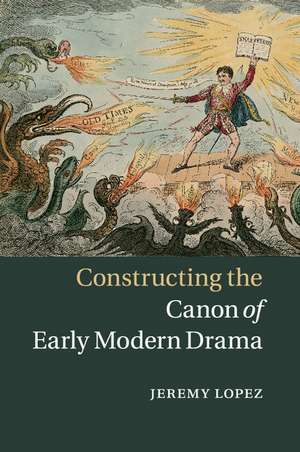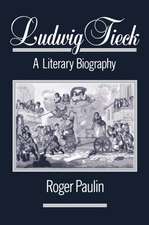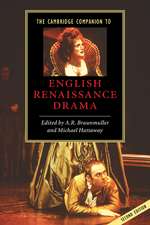Constructing the Canon of Early Modern Drama
Autor Jeremy Lopezen Limba Engleză Paperback – 25 oct 2017
| Toate formatele și edițiile | Preț | Express |
|---|---|---|
| Paperback (1) | 282.65 lei 6-8 săpt. | |
| Cambridge University Press – 25 oct 2017 | 282.65 lei 6-8 săpt. | |
| Hardback (1) | 695.32 lei 6-8 săpt. | |
| Cambridge University Press – 15 ian 2014 | 695.32 lei 6-8 săpt. |
Preț: 282.65 lei
Nou
Puncte Express: 424
Preț estimativ în valută:
54.08€ • 58.93$ • 45.57£
54.08€ • 58.93$ • 45.57£
Carte tipărită la comandă
Livrare economică 23 aprilie-07 mai
Preluare comenzi: 021 569.72.76
Specificații
ISBN-13: 9781316627464
ISBN-10: 1316627462
Pagini: 243
Ilustrații: 1 b/w illus.
Dimensiuni: 153 x 230 x 18 mm
Greutate: 0.33 kg
Editura: Cambridge University Press
Colecția Cambridge University Press
Locul publicării:Cambridge, United Kingdom
ISBN-10: 1316627462
Pagini: 243
Ilustrații: 1 b/w illus.
Dimensiuni: 153 x 230 x 18 mm
Greutate: 0.33 kg
Editura: Cambridge University Press
Colecția Cambridge University Press
Locul publicării:Cambridge, United Kingdom
Cuprins
Part I. Early Modern Dramatic Canons: Origins: 1. Excluding Shakespeare; 2. Trollope's Dilke; 3. What is an anthology? (Part 1); 4. Collecting early modern drama, 1744 to the present; 5. Ejecta; 6. How to use this book; 7. Table of contents; 8. Autogenesis: The Custom of The Country (Part 1); 9. Endless tragedy; 10. Negative canon; Attachments: 11. Lamb in the library; 12. Dodsley's Hog; 13. Blunt instrument; 14. Fragments; 15. Comedy and tragedy; 16. The Mermaid series; 17. The Keltie exception; 18. The ties that bind: The Custom of The Country (Part 2); 19. Hints of designs; 20. What is an anthology? (Part 2); Paradoxes: 21. Introductory; 22. Bullen's Nero; 23. Collier's Reed's Dodsley; 24. Beaumont our contemporary; 25. History in disguise; 26. The aesthetic under erasure; 27. The turn of the corkscrew; 28. Return of the repressed: The Custom of The Country (Part 3); 29. The Changeling; 30. The greatness of English Renaissance drama; Interlude: reading a bad play: The Fair Maid of Bristow; Part II. Early Modern Dramatic Forms: Bifurcation: 31. The Bowers Dekker; 32. Fletcher's Shakespeare; 33. Early modern dramatic form; 34. The Bloody Brother; 35. Early modern dramatic forms; 36. What is an anthology? (Part 3); 37. Apples and oranges; 38. The sleepwalker: Northward Ho (Part 1); 39. The war in The Shoemaker's Holiday; 40. The Holaday Chapman; Opposition: 41. Laws of canon; 42. Rowley's sow; 43. Form in collaboration; 44. Love's Labors Won; 45. 'A sort of dramatic monster'; 46. What should an anthology be?; 47. The surviving image; 48. Other voices: Northward Ho (Part 2); 49. Disappearing act; 50. Anon., anon; Inheritance: 51. Voluminous Heywood; 52. Ford's Webster; 53. Labored forms; 54. The Triumph of Time; 55. Moral Massinger; 56. No heir; 57. Apocalypse now; 58. Bedlam at Ware: Northward Ho (Part 3); 59. Modern times; 60. Principles of selection and exclusion; Afterword; List of primary-text editions; Bibliography.
Recenzii
'This is a remarkable book: confidently and wittily written, exhaustively and widely researched, timely, provocative, enlightening and highly original. The strength of Lopez's argument is that he resists the impulse to shape his own anthology, offering instead a history and a method of critical enquiry and appreciation that completely destabilise current practice.' Richard Cave, Royal Holloway, University of London
'By moving beyond a Shakespeare-based repertoire, Lopez is taking a look at which plays were considered better than others, what kind of criteria were used in the making of those judgements, and especially how the works selected to exemplify the early modern era might change.' Amy Arden, Folger Magazine
'By moving beyond a Shakespeare-based repertoire, Lopez is taking a look at which plays were considered better than others, what kind of criteria were used in the making of those judgements, and especially how the works selected to exemplify the early modern era might change.' Amy Arden, Folger Magazine
Notă biografică
Descriere
Through short, provocative readings of unfamiliar plays, this book provides the first ever history of the canon of Renaissance drama.


















